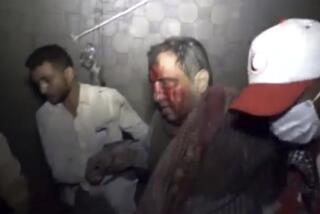Secretary of State Hillary Rodham Clinton presses Yemen on terrorism fight
- Share via
Reporting from Sana — Secretary of State Hillary Rodham Clinton arrived in Yemen on Tuesday to press its government for greater cooperation in combating terrorism, promising in return that the United States would do more for the impoverished country.
Clinton, the first American secretary of State to visit Yemen in 20 years, met for three hours with President Ali Abdullah Saleh and heard promises from him that he is “fully committed” to helping the United States destroy the Al Qaeda offshoot based in the Arabian Peninsula, a senior U.S. official said.
Clinton, meanwhile, promised a new American commitment to help develop the economy and political system of Yemen, the poorest Arab state. She signaled her intentions by gently pressing Saleh, who is embroiled in a deepening dispute with minority opposition parties, to take new steps to open the country’s political system.
Clinton’s two-part message reflects the delicate U.S. position on Yemen, which is increasingly serving as a launching pad for terrorist attacks; in October, for example, U.S.-bound packages from Yemen containing bombs were found on cargo planes. The United States is eager for Yemen’s cooperation, yet it can’t afford to let Yemenis, already wary of American intervention, think that the United States has no interest in the country except in eliminating Islamist militant groups operating here.
“We need to show this is not just about us,” said the U.S. official, who spoke on condition of anonymity because it is a sensitive diplomatic matter. “We have to have a balance in our relationship with Yemen.”
Clinton didn’t come with offers of new aid, but she noted that U.S. spending on nonmilitary assistance has been surging and is now more than $130 million a year. She said the United States also might be willing to help Yemen deal with the crises it faces over the shrinking of its oil and gas supplies.
Clinton said the new message of American support is aimed at the Yemeni people as much as top government officials.
“We want a broad and comprehensive partnership, not only with the government of Yemen, but with the people of Yemen,” Clinton said in an appearance with Saleh at his palace in Sana.
U.S. officials say they are grateful for Saleh’s cooperation. But Saleh has sometimes put limits on American anti-terrorism operations when he feared they might cause a backlash.
In Tuesday’s meeting, Saleh said he understood that terrorism is a threat to his country as well as to the United States. He said “some things that were encouraging,” the U.S. official said, declining to provide further details.
Asked which set of issues was more important to the United States in the discussions, the official said, “I don’t think we can overemphasize the counter-terrorism side.”
But U.S. officials also are concerned that the terrorism threat from Yemen could worsen if the country, with an exploding population and fast-disappearing stores of oil and water, became even poorer.
Clinton, in a town hall session with parliament members and business and civic leaders, said the government risked dangerous instability if it did not respond to demands for a wider sharing of power. The new generation of Yemenis, she said in prepared remarks, “will be seeking responsive democratic governance that reaches and serves their communities.”
Yemen’s political system has been locked in a battle over a proposal by Saleh’s ruling party to change the constitution to allow him to be president for life. Clinton said before her meeting that she intended to tell Saleh that “there are better ways” to strengthen the political system than through such a constitutional change.
She said she would mention that the United States also would prefer to see term limits set for the presidency, which Saleh has held since 1978.
Another issue is upcoming parliamentary elections in April.
“We want to see the president and opposition agree on how to hold parliamentary elections that will be fair and legitimate and inclusive,” Clinton told reporters.
The U.S.-Yemeni relationship was strained in November with the release by WikiLeaks of U.S. diplomatic cables dealing with Yemen. They quoted Saleh as saying his government would continue telling the public that the Yemeni military was conducting strikes against militants, when the attacks were actually by U.S.
But the senior U.S. official said the WikiLeaks episode had received only a brief mention in the meeting.
Clinton is in the middle of a five-day tour of the Persian Gulf region, discussing with leaders there the perceived threat posed by Iran’s nuclear development program, urging support for the new government of Iraq and backing a broadened role for civil society groups in the Arab world.
More to Read
Sign up for Essential California
The most important California stories and recommendations in your inbox every morning.
You may occasionally receive promotional content from the Los Angeles Times.










